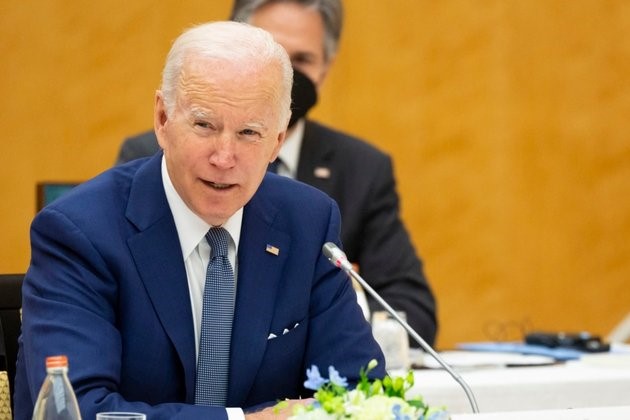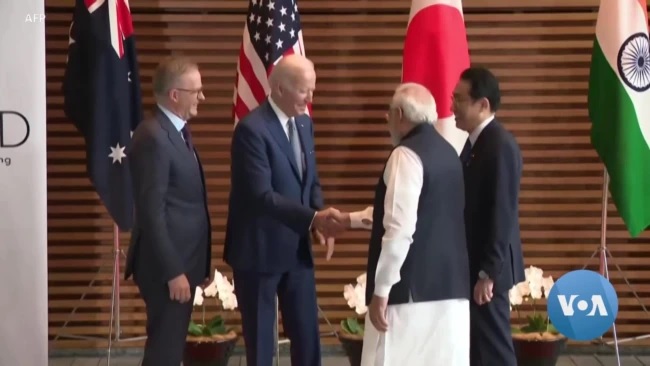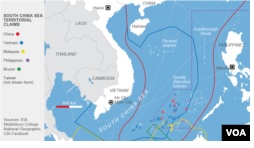Biden Ends Asia Trip With Warning Seen as Signal to China


Winding up his 6-day trip to Asia, U.S. President Joe Biden used the war in Ukraine to send a message to China to uphold the fundamental principles of the international order, says VOA in a report from Tokyo.
“Territorial integrity and sovereignty, international law, human rights must always be defended, regardless of where they’re violated in the world,” Biden said in remarks during a Tokyo summit with leaders of Japan, India and Australia – the informal grouping known as the Quad, the report added.
Russia’s invasion of Ukraine heightens the importance of the administration’s strategy goals to “advance a free, open, connected, secure and resilient Indo-Pacific,” Biden was quoted as saying during the Quad meeting on his last day in Asia, with Japanese Prime Minister Fumio Kishida, Indian Prime Minister Narendra Modi and newly elected Australian Prime Minister Anthony Albanese.
 Australian Prime Minister Anthony Albanese, U.S. President Joe Biden, Japanese Prime Minister Fumio Kishida, and Indian Prime Minister Narendra Modi attend the Japan-U.S.-Australia-India Fellowship Founding Celebration event, in Tokyo, Japan, May 24, 2022.
Australian Prime Minister Anthony Albanese, U.S. President Joe Biden, Japanese Prime Minister Fumio Kishida, and Indian Prime Minister Narendra Modi attend the Japan-U.S.-Australia-India Fellowship Founding Celebration event, in Tokyo, Japan, May 24, 2022.
“As long as Russia continues the war, the United States will work with our partners to help be the global response, because it’s going to affect all parts of the world,” Biden said. “At the same time, the United States must and will be strong, steady, and enduring partner in the Indo-Pacific.”
Kishida echoed Biden’s statement. “Russian invasion into Ukraine squarely challenges the principles which are enshrined in the United Nations Charter,” he said. “We should never, ever allow a similar incident to happen in the Indo-Pacific.”
The Quad joint statement and the remarks of the four leaders did not mention China direct, VOA noted in its despatch but added that the statement has underscored the goal of building an Indo-Pacific region that respects sovereignty and the rule of law – diplomatic wording understood to be directed at Beijing.
Beijing has dramatically increased its military spending in recent years, including its naval power. It now has the world’s second largest defense budget after the United States. And in terms of the numbers of vessels it claims it has, the Chinese navy is now the biggest in the world, said Sam Roggeveen, director of the Lowy Institute’s International Security Programme.
“In terms of its capability, it’s still very much second best to the United States, but it’s catching up very quickly,” Roggeveen told VOA.
While many in the region fear an invasion of Taiwan, Chinese militarization is most acutely felt in the disputed waters of the South China Sea, where Beijing has transformed at least three artificial islands into military bases despite President Xi Jinping’s past assurances that it would not.
China controls the Paracel Islands, one of two major archipelagos in the South China Sea, and claims entire ownership of the other – the Spratly Islands – also claimed entirely by Taiwan and Vietnam. Brunei, Malaysia, and the Philippines claim parts of Spratly.
The seas are extremely strategic with trillions of dollars’ worth or approximately one-third of all global maritime trade passing through its shipping lanes each year.
Quad leaders stated they “strongly oppose any coercive, provocative or unilateral actions that seek to change the status quo and increase tensions in the area, such as the militarization of disputed features, the dangerous use of coast guard vessels and maritime militia, and efforts to disrupt other countries’ offshore resource exploitation activities.”
Indo-Pacific Partnership for Maritime Domain Awareness
 As part of an effort to counter Chinese activity in the region, Quad leaders unveiled a maritime initiative aimed at monitoring territorial waters, the Indo-Pacific Partnership for Maritime Domain Awareness, IPMDA.
As part of an effort to counter Chinese activity in the region, Quad leaders unveiled a maritime initiative aimed at monitoring territorial waters, the Indo-Pacific Partnership for Maritime Domain Awareness, IPMDA.
According to a statement released by the White House, the program will use satellite technology to connect existing surveillance centers and create a tracking system for illegal fishing from the Indian Ocean and Southeast Asia to the South Pacific. It will track “dark shipping” – vessels with their transponder systems switched off to avoid detection.
The initiative will also give regional partners the tools they need to conduct rescue at sea and other humanitarian activities, said an administration official in a briefing to reporters.
“The data will be unclassified, which will allow the Quad to provide it to a wide range of partners who wish to benefit,” the official said. “And it recognizes that the primary demand on this in many ways is not from militaries, it is for the equivalent of Coast Guards to be able to do both rescue at sea, to be able to monitor fishing, to be able to track illegal fishing.”
China is the worst illegal fishing offender, according to the 2021 IUU Fishing Index, which maps illegal, unreported, and unregulated fishing in 152 coastal countries.
Illegal, unreported and unregulated fishing profoundly impacts the economies of regional countries such as Indonesia and Malaysia, removing billions of dollars’ worth of fish every year from their legal trading system.
To share information on these activities with partner countries, the initiative will utilize the existing regional “fusion centers” that are currently focused on tracking maritime piracy, such as the Information Fusion Center-Indian Ocean Region, based in India; the Information Fusion Center, based in Singapore; the Pacific Islands Forum Fisheries Agency, based in the Solomon Islands and the Pacific Fusion Center, based in Vanuatu, both of which receive support from Australia.
While most regional countries are aware of the extent of illegal fishing in their waters, some lack the capacity to address the problem and others lack the political will because they are also engaged in the activity, said Aaron Connelly, a senior fellow for Southeast Asian politics and foreign policy at the International Institute for Strategic Studies.
“And so, while this is intended, I think, to highlight Chinese actions in their waters, it may also highlight some of the countries that the United States and the Quad countries are trying to court, what they are doing in others’ waters,” Connelly told VOA.
The initiative lacks details as Quad partners say it will begin consultations with partners in the region. What also remains unclear, Connelly pointed out, is what countries will do with the surveillance data.
“So, I’m not sure that this is going to make a difference,” Connelly said. “It’s not the game changer that the administration in its statement said that it would be.”
As the initiative proceeds, “the Quad will identify future technologies of promise, allowing IPMDA to remain a cutting-edge partnership that promotes peace and stability throughout the region,” according to the White House.
……………………………………
-
Book Shelf
-
 Book Review
DESTINY OF A DYSFUNCTIONAL NUCLEAR STATE
Book Review
DESTINY OF A DYSFUNCTIONAL NUCLEAR STATE
- Book ReviewChina FO Presser Where is the fountainhead of jihad?
- Book ReviewNews Pak Syndrome bedevils Indo-Bangla ties
- Book Review Understanding Vedic Equality….: Book Review
- Book Review Buddhism Made Easy: Book Review
- Book ReviewNews Elegant Summary Of Krishnamurti’s teachings
- Book Review Review: Perspectives: The Timeless Way of Wisdom
- Book ReviewNews Rituals too a world of Rhythm
- Book Review Marx After Marxism
- Book Review John Updike’s Terrorist – a review
-
-
Recent Top Post
-
 CommentariesNews
Ides of trade between India and Pakistan
CommentariesNews
Ides of trade between India and Pakistan
-
 CommentariesTop Story
Palestinians at the cross- roads
CommentariesTop Story
Palestinians at the cross- roads
-
 Commentaries
While Modi professes concern for the jobless, “his government’s budget escalates class war”
Commentaries
While Modi professes concern for the jobless, “his government’s budget escalates class war”
-
 CommentariesNews
Politics of Mayhem: Narrative Slipping from Modi ….?
CommentariesNews
Politics of Mayhem: Narrative Slipping from Modi ….?
-
 Commentaries
Impasse over BRI Projects in Nepal
Commentaries
Impasse over BRI Projects in Nepal
-
 CommentariesNews
Yet another Musical Chairs in Kathmandu
CommentariesNews
Yet another Musical Chairs in Kathmandu
-
 CommentariesTop Story
Spurt in Anti-India Activities in Canada
CommentariesTop Story
Spurt in Anti-India Activities in Canada
-
 NewsTop Story
Nepal: Political Stability Under Threat Again
NewsTop Story
Nepal: Political Stability Under Threat Again
-
 NewsTop Story
Accountability Tryst With 2024 Ballot….
NewsTop Story
Accountability Tryst With 2024 Ballot….
-
 NewsTop Story
What Would “Total Victory” Mean in Gaza?
NewsTop Story
What Would “Total Victory” Mean in Gaza?
-
AdSense code



















